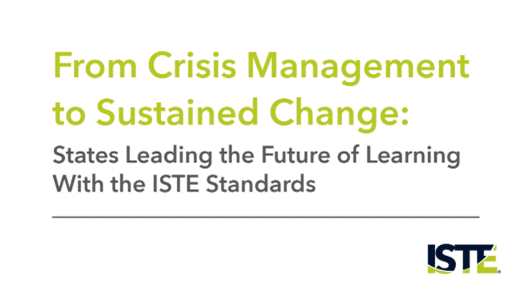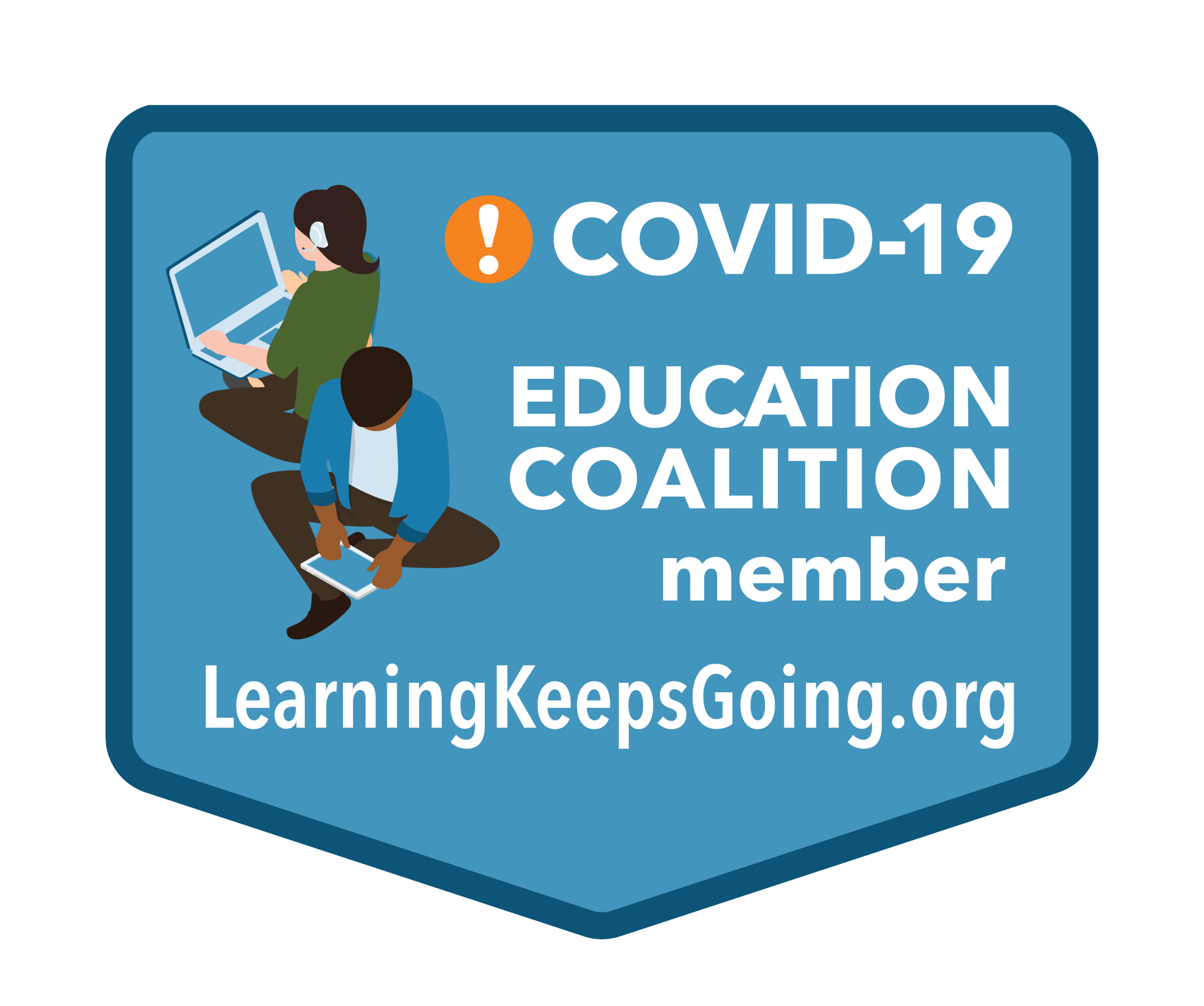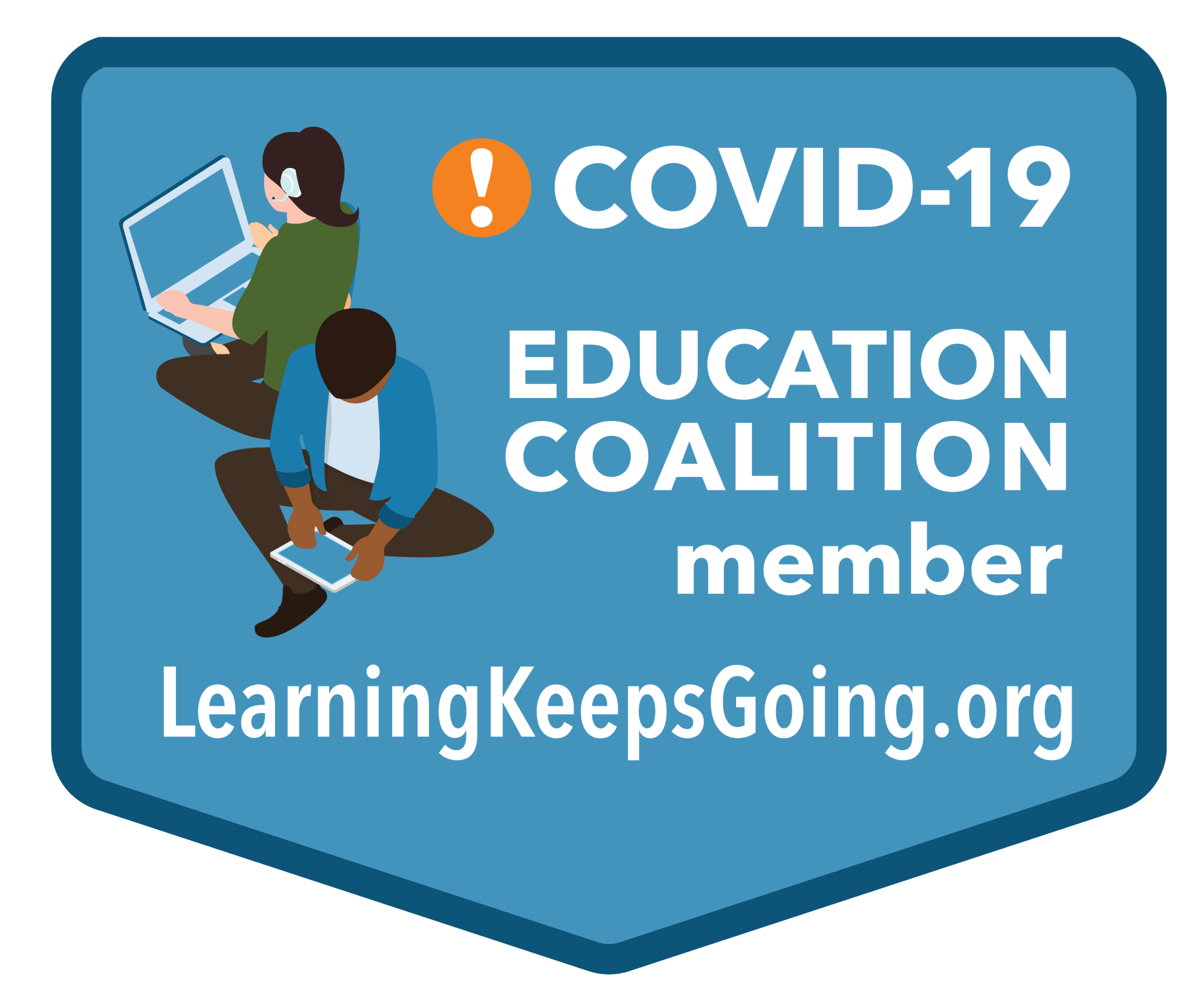29 Jan2021
By Ji Soo Song
 ISTE has released its newest policy report, “From Crisis Management to Sustained Change: States Leading the Future of Learning With the ISTE Standards.”
ISTE has released its newest policy report, “From Crisis Management to Sustained Change: States Leading the Future of Learning With the ISTE Standards.”
Fueled by the rapid transition to online and blended instruction in response to COVID-19 and continued need to equitably improve student outcomes, educators, and leaders across the country have faced an unprecedented challenge to design, implement, and scale learning strategies made possible through technology. This challenge also presents a new opportunity, as systems and strategies used to address COVID-19 can also propel our schools forward towards the future of learning and better meet students’ and educators’ needs.
29 Sep2020
By Ji Soo Song

The International Society for Technology in Education (ISTE), the Education Commission of the States, and Whiteboard Advisors will host a webinar on October 7 at 1:00 p.m. ET to discuss how states and districts are continuing to embed digital citizenship and media literacy into instruction during COVID-19 and remote learning.
Creating a Renewed Vision Around Digital Citizenship
Wednesday, October 7, 1:00 p.m. ET
11 Sep2020
By Ji Soo Song
 The undersigned members of the COVID-19 Education Coalition offer the following statement on the Delivering Immediate Relief to America’s Families, Schools and Small Businesses Act:
The undersigned members of the COVID-19 Education Coalition offer the following statement on the Delivering Immediate Relief to America’s Families, Schools and Small Businesses Act:
Our coalition is deeply concerned with the Delivering Immediate Relief to America’s Families, Schools and Small Businesses Act because of its low education funding levels, its fixation on physical reopenings of school buildings, and its failure to provide direct support for professional development in online learning. The bill would provide just $70 billion in additional K-12 education stabilization funds, a figure that is far short of the $200 billion that many educational groups feel is required to meet their needs. Additionally, we are concerned that the bill would condition receipt of two-thirds of this funding to the physical reopening of school buildings. This requirement ignores recent reports showing that 95% of districts plan to offer remote instruction to some degree, with about a third planning on remote instruction exclusively. This restriction makes no sense and will only adversely impact marginalized communities, including students of color, homeless students, students in foster care, and students with disabilities.
We also must note that this bill fails to provide separate funding for a key priority: professional development for online learning. Recently released studies point to the urgent need to support educators to deliver effective and equitable learning experiences. For example, more than one-fifth of educators have not received any training as it relates to technology-based remote instruction. A separate survey shows that a majority of novice educators do not feel well-prepared to provide online learning experiences for their students, as their preparation programs had not trained them on research-based technology integration frameworks.
03 Aug2020
By Ji Soo Song
 The undersigned members of the COVID-19 Education Coalition offer the following statement on the Health, Economic Assistance, Liability Protection, and Schools (HEALS) Act:
The undersigned members of the COVID-19 Education Coalition offer the following statement on the Health, Economic Assistance, Liability Protection, and Schools (HEALS) Act:
We are deeply concerned with provisions of the HEALS Act, which proposes $70 billion to support K-12 schools in navigating the fallout from the COVID-19 global pandemic, two-thirds of which is tied to the physical reopening of school buildings. With many districts unable to safely reopen at this time because of high community transmission rates, many schools stand to lose out on a substantial portion of the HEALS Act’s promised resources, which they desperately need to ensure high-quality teaching and learning continues for the 2020-2021 school year. Additionally, the $70 billion allocated to K-12 schools is far short of the funding that national experts estimate will be necessary to fully support educators, students, and families at this time, especially those from marginalized groups disproportionately impacted by COVID-19. Many of our organizations believe that K-12 schools need between $175 billion and $200 billion.
16 Jul2020
By Ji Soo Song

The undersigned members of the COVID-19 Education Coalition offer the following statement on the Coronavirus Child Care and Education Relief Act (CCCERA) and FY21 federal education appropriations:
As states and districts continue preparing for the upcoming school year, national data reveal the critical need to support educators’ capacity to deliver effective and equitable online learning experiences. For example, a recent survey revealed discrepancies in the quality of instruction available to students from higher-income versus low-income families. Although the CARES Act provided some federal dollars to support educator professional development, experts agree that the current education stabilization funds are inadequate to fully support schools, students, educators, and families through the COVID-19 global pandemic.
18 Jun2020
By Ji Soo Song
 The effects of COVID-19 on students and families require district leaders to collaborate with local stakeholders — including administrators, classroom teachers, school support staff, parents, and students — to plan strategic actions that allow digital learning to effectively and equitably continue into the summer and beyond.
The effects of COVID-19 on students and families require district leaders to collaborate with local stakeholders — including administrators, classroom teachers, school support staff, parents, and students — to plan strategic actions that allow digital learning to effectively and equitably continue into the summer and beyond.
The International Society for Technology in Education (ISTE), Turnaround for Children, the National Center for Learning Disabilities (NCLD), the Future of Privacy Forum (FPF), and the New Hampshire Society for Technology in Education (NHSTE) — who are members of the broader COVID-19 Education Coalition — provide three key considerations that districts must keep in mind as they build immediate and long-term plans: equitable infrastructure, active digital learning content, and educator capacity building.
View this new resource: Providing Effective and Equitable Digital Learning for all Students: Key Considerations for Districts.
 ISTE has released its newest policy report, “From Crisis Management to Sustained Change: States Leading the Future of Learning With the ISTE Standards.”
ISTE has released its newest policy report, “From Crisis Management to Sustained Change: States Leading the Future of Learning With the ISTE Standards.”







 The undersigned members of the COVID-19 Education Coalition offer the following statement on the Delivering Immediate Relief to America’s Families, Schools and Small Businesses Act:
The undersigned members of the COVID-19 Education Coalition offer the following statement on the Delivering Immediate Relief to America’s Families, Schools and Small Businesses Act: The undersigned members of the COVID-19 Education Coalition offer the following statement on the
The undersigned members of the COVID-19 Education Coalition offer the following statement on the 